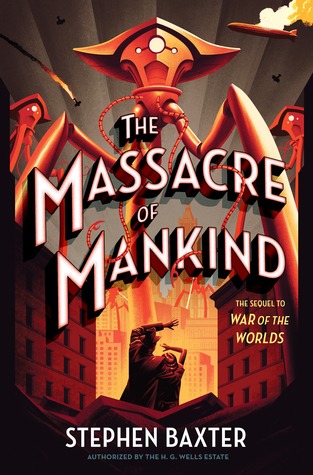The Massacre of Mankind

The Massacre of Mankind
Stephen Baxter
Crown
A sequel to the H.G. Wells classic THE WAR OF THE WORLDS, brilliantly realized by award-winning SF author and Wells expert Stephen Baxter
It has been 14 years since the Martians invaded England. The world has moved on, always watching the skies but content that we know how to defeat the Martian menace. Machinery looted from the abandoned capsules and war-machines has led to technological leaps forward. The Martians are vulnerable to earth germs. The Army is prepared.
So when the signs of launches on Mars are seen, there seems little reason to worry. Unless you listen to one man, Walter Jenkins, the narrator of Wells' book. He is sure that the Martians have learned, adapted, understood their defeat.
He is right.
Thrust into the chaos of a new invasion, a journalist - sister-in-law to Walter Jenkins - must survive, escape and report on the war.
The Massacre of Mankind has begun.
I'm always a little wary of sequels to older, classic works of literature. It's difficult to get into the same mindset as the original author (especially depending on how long its been since said original book has been published) and to put it plainly, most sequels end up being half-rate, ghostly copies of the original.
Yet as far as being a sequel to War of the Worlds, The Massacre of Mankind does a decent enough job, and I thought it kept in with the original's tone well. Of course, I don't hate the original, but I'm not its biggest fan, either, so I admit a rather neutral view. I'm sure hardcore fans of H.G. Wells will be much pickier than I. For me, the weakest part of The Massacre of Mankind is, perhaps predictably, the middle- the book suffered from being too long (yet with an ending that felt strangely unfinished). Half science fiction, half alternate history, I think my favorite aspect of the novel was seeing a new version of the 1920s...a version still reeling from an alien invasion nearly 15 years before. Recognizable names pop up occasionally--Edison, Churchill, even Charlie Chaplin--in a context similar to where we find them in our world, yet not quite. The novel's plot especially picks up in part three, where we get glimpses of a worldwide Martian invasion from a variety of cities.
But ironically, my least favorite aspect of this novel was in some of the ways it stayed to true to the original, keeping with a worldview that is largely godless and empty, giving a meaningless, dim view of the mankind and the universe itself. Many won't mind this, finding it realistic and accurate. For me, it makes the characters dull and their plight less appealing. (a fact not helped by the book's unneeded length.)
With a little (err...a lot of?) tweaking, I can't deny I'd love to watch a movie version of this, if only because I can imagine what a great deco-punk aesthetic wonder we'd get out of it. But overall, while being mildly entertaining, ultimately The Massacre of Mankind didn't feel like it had anything particularly profound to offer that The War of the Worlds didn't.
I received this book for free from bloggingforbooks.com in exchange for my honest review.

Comments
Post a Comment